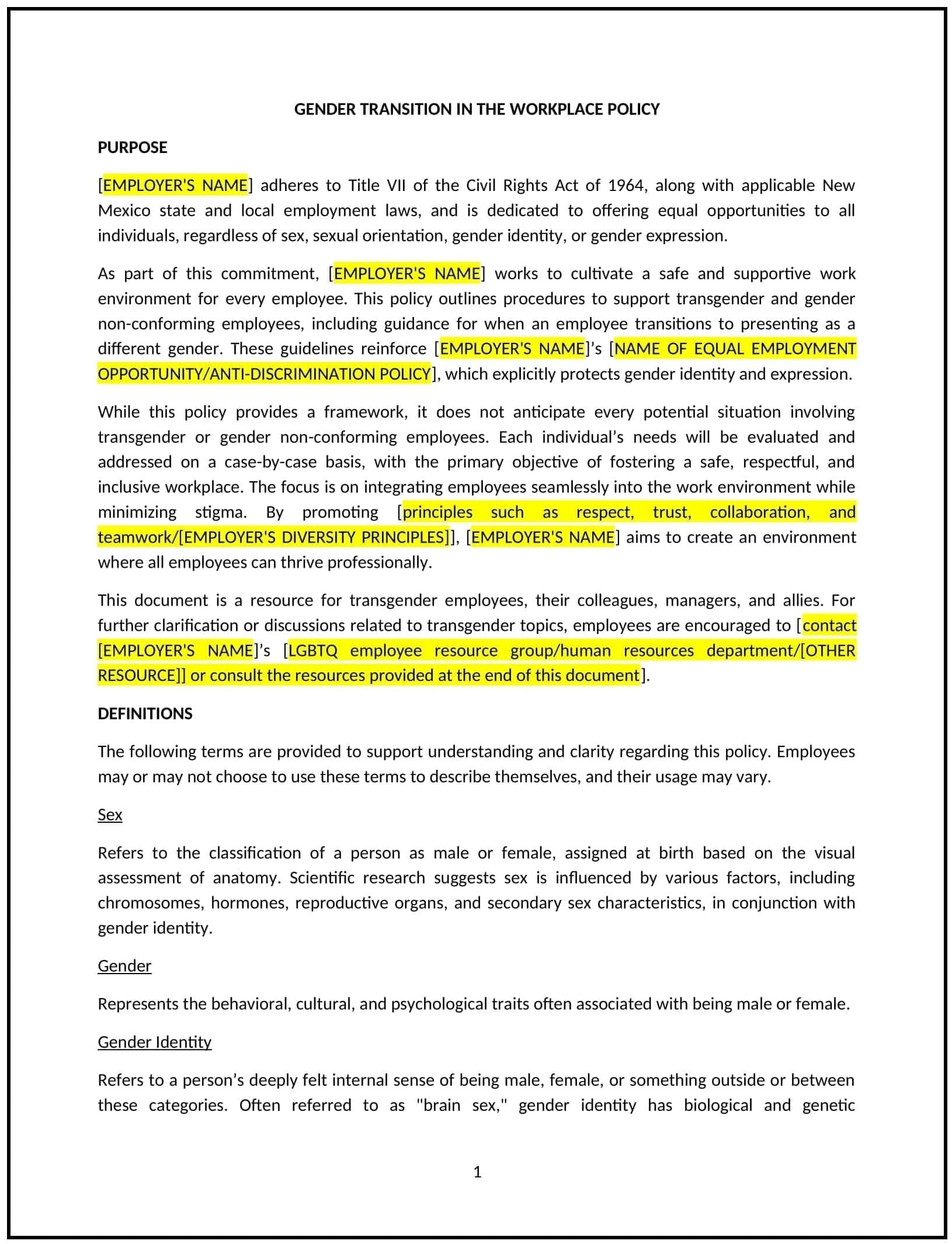Gender transition in the workplace policy (New Mexico): Free template
Got contracts to review? While you're here for policies, let Cobrief make contract review effortless—start your free review now.

Customize this template for free
Gender transition in the workplace policy (New Mexico)
This gender transition in the workplace policy is designed to support New Mexico businesses in creating an inclusive, respectful, and supportive environment for employees undergoing gender transition. It outlines the steps the business will take to ensure that employees transitioning in gender are treated with dignity and respect, and that their rights are protected throughout the process.
By adopting this policy, New Mexico businesses can foster a more inclusive work culture, promote diversity, and support employees during significant personal changes, while ensuring that all employees feel safe and valued.
How to use this gender transition in the workplace policy (New Mexico)
- Define key terms: Clearly define terms related to gender transition, such as “gender identity,” “transition,” and “gender expression,” to ensure all employees understand the policy’s scope.
- Establish respectful communication guidelines: Specify how employees should communicate about gender transition, including how they should address colleagues and how to handle the use of correct names and pronouns.
- Outline confidentiality protections: Ensure that information about an employee’s gender transition is kept confidential, and specify that employees will not be required to disclose their gender identity unless they choose to do so.
- Set guidelines for workplace accommodations: Provide details on any necessary accommodations that may be required during the transition process, such as adjusting uniforms, bathroom facilities, or office spaces, to create an inclusive environment.
- Reflect New Mexico-specific considerations: Address any state-specific legal protections for gender identity and expression, such as those in New Mexico’s Human Rights Act, and incorporate them into the policy. Consider also any specific healthcare-related benefits or insurance policies that support employees during gender transition.
Benefits of using this gender transition in the workplace policy (New Mexico)
Implementing this policy provides New Mexico businesses with several advantages:
- Fosters an inclusive workplace: A clear gender transition policy demonstrates the business’s commitment to diversity and inclusion, ensuring all employees are treated with dignity and respect, regardless of gender identity.
- Enhances employee retention: By offering support during gender transitions, businesses can retain talented employees who may otherwise face discrimination or a lack of support in the workplace.
- Promotes employee well-being: Creating a supportive environment for gender transition helps reduce stress and anxiety for employees, allowing them to focus on their work and thrive in the workplace.
- Reduces discrimination claims: A clear and proactive policy helps minimize the risk of legal claims related to discrimination or harassment, particularly in light of New Mexico’s anti-discrimination laws regarding gender identity.
- Strengthens the company’s reputation: Businesses known for their commitment to inclusivity attract diverse talent and enhance their reputation as socially responsible employers.
Tips for using this gender transition in the workplace policy (New Mexico)
- Communicate the policy clearly: Ensure that all employees are aware of the gender transition policy, either through the employee handbook, company intranet, or regular training sessions.
- Provide training for managers: Offer training on gender identity and transition-related issues to help managers understand how to support employees and address any concerns in a respectful and sensitive manner.
- Encourage open dialogue: Create an open and supportive environment where employees can discuss their gender identity or transition needs with HR or their managers if they feel comfortable doing so.
- Offer flexibility and support: Be flexible with employees during their gender transition process and provide accommodations that respect their needs and preferences, whether related to their work environment, benefits, or schedule.
- Review and update the policy regularly: Regularly review the policy to ensure it reflects current best practices, evolving legal requirements in New Mexico, and feedback from employees.